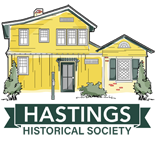
The 2009 Hudson-Fulton-Champlain Quadricentennial has stirred an excitement in early New York history that lingers on into 2010, especially at institutions that have collections rich in that period. Such is the case with the New York Public Library. Their current exhibition entitled “Mapping New York’s Shoreline, 1609 – 2009” opened in September 2009 at the 42nd Street branch of the library, and remains on view until this coming June.
The library’s map collection is one of the best in the world. But this exhibition also draws on their impressive store of prints, photographs, ephemera, documents from the genealogical collection, and, naturally, books. The display illustrates how knowledge of the New York shoreline — and the shoreline itself — changed from the time of the earliest European explorers to today. There is a focus on the Dutch period and on the American Revolution, but the show also traces the development of transportation along the waterways and the impact of other events like California’s Gold Rush. Many of the items relate to Manhattan’s shoreline, especially its southern tip, but others show the Jersey shore, the Long Island Sound, and, naturally, the Hudson River.

This is, of course, where Hastings comes in. It is fun to walk from decade to decade trying to find a mention of Hastings’ tribe of Weckuaesgeeks, and spot the first appearance of “W. Chester.” There is an entire small gallery devoted to maps of the Hudson River, including a map pasted onto the floor so you can walk, with a giant’s steps, the entire length of the Hudson River in a few paces. Naturally, we think that more attention should have been paid to Hastings-on-Hudson. One map places it below the Greystone train station, and another attributes to John William Draper the first photograph ever taken and dates it a decade before the camera was even invented. Tsk tsk. As we all know, John William Draper is only credited with taking the first photograph of the moon and one of the first photographs of the human face.
But, all in all, this is a fascinating show for anyone interested in the history of New York or the Hudson River, and offers many different ways to look at, and think about, New York. Look for the 1719 view of “Ye Flourishing City of New York”, the copy of The New York Mercury from 1787 with news from the East and West Indies, and the wonderful 19th-century prints of New York Harbor and the Brooklyn Bridge. There is also an interesting video showing how one of the documents on display was prepared for the exhibition by the library’s staff of paper conservators, and another, more high-tech, video showing how some of the library’s old maps can be digitally mapped onto a Google globe of the Earth.
The exhibition is free, and open during New York Public Library hours. See their web site for further information and related programs, and also take a look at their related Flickr photostream set — it includes many images of the Hudson River, including postcards and stereoviews, that are not in the exhibition.










